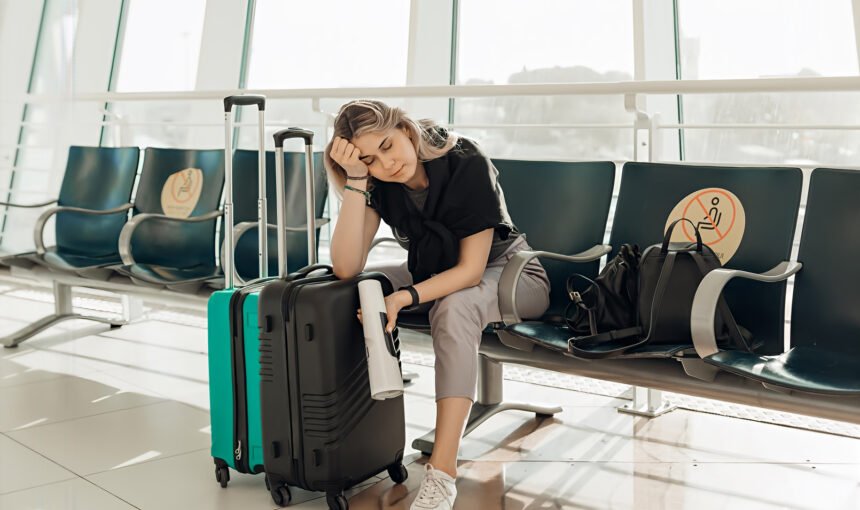Traveling is one of the most exciting and rewarding experiences, but it comes with its own set of risks. Scams targeting travelers are unfortunately common, and they can turn a dream vacation into a nightmare. From pickpockets on crowded streets to fake accommodation listings online, scammers are always finding new ways to trick unsuspecting tourists.
Being aware of these potential dangers and knowing how to avoid them is crucial. This guide will help you spot common travel scams and provide practical tips on how to stay safe. We’ll cover everything from street scams and transport tricks to fake rental listings and shopping rip-offs. Plus, you’ll learn what to do if you do fall victim to a scam, so you can recover quickly and get back to enjoying your trip.
Stay vigilant, and with the right knowledge, you can keep your travels safe and stress-free.ulvinar dapibus leo.
Common Types of Travel Scams
Street Scams
When you’re out exploring new places, it’s important to stay alert to some common street scams.
Pickpocketing: This is one of the oldest tricks in the book. Skilled pickpockets can snatch your wallet or phone without you even noticing. They often work in busy areas like markets, tourist attractions, and public transport. Keeping your valuables in a secure, hard-to-reach place can help protect you.
Fake Charities: You’ll sometimes encounter people asking for donations for seemingly good causes. They might show you convincing documents or even wear uniforms. Unfortunately, many of these are scams. If you want to donate, it’s safer to do so through verified organizations.
Distraction Techniques: Scammers often use distractions to catch you off guard. Someone might “accidentally” spill something on you, ask for directions, or create a commotion. While you’re distracted, an accomplice might be stealing your belongings. Staying aware of your surroundings and not getting too distracted can help you avoid falling victim to these tactics.
Transport Scams
Traveling around a new place can be tricky, and scammers know this. Here are some common transport scams to watch out for:
Overcharging Taxis: Some taxi drivers take advantage of tourists by overcharging them. They might take longer routes or claim their meter is broken. To avoid this, always agree on a fare before getting in or make sure the meter is running. Using reputable taxi services or apps can also help ensure you’re not being ripped off.
Fake Rideshares: With the popularity of rideshare apps, scammers have found ways to exploit this too. Fake rideshares can look legitimate but may charge you extra or take you to unsafe areas. Always check the license plate and driver details before getting in, and use the app to track your route.
Ticket Fraud: Buying transport tickets from unofficial sources can lead to trouble. Scammers might sell you fake tickets for buses, trains, or attractions. To avoid this, always purchase tickets from official counters or trusted websites. If a deal seems too good to be true, it probably is.
Accommodation Scams
Finding a place to stay is a big part of travel, but there are scams to watch out for here too:
Fake Rental Listings: Scammers create fake listings for apartments, houses, or rooms that either don’t exist or aren’t available. They might ask for a deposit upfront and then disappear. To avoid this, use reputable booking platforms and read reviews carefully. If possible, contact the host directly through the platform’s messaging system before making any payments.
Overcharging for Rooms: Some hotels or landlords might try to charge you more than the agreed price, especially if they think you won’t argue. Always confirm the price in writing when you book and bring a copy of the confirmation with you. If you’re charged more than expected, don’t hesitate to question it.
Hidden Fees: Unexpected fees can pop up at the end of your stay, from extra charges for amenities to inflated cleaning fees. To avoid surprises, read the fine print when booking and ask about any additional charges upfront. Knowing exactly what’s included in your stay can help you avoid these hidden costs.
Shopping and Dining Scams
When you’re out enjoying local shops and restaurants, it’s important to be aware of these common scams:
Overpriced Souvenirs: Tourist shops often hike up prices, hoping you won’t know the local rates. You might end up paying way more than an item is worth. To avoid this, compare prices at different stores and try bargaining if it’s common in that area. Shopping at local markets where locals buy can also give you a better idea of fair prices.
Restaurant Bill Padding: Some restaurants add extra items or inflate prices on your bill, counting on you not to notice. Always check your bill carefully before paying. If you see charges you don’t recognize, ask the waiter to explain them. Keeping a mental note of what you ordered can help you spot any discrepancies.
Fake Goods: It’s tempting to buy branded items at a fraction of the cost, but often these are counterfeit. From designer clothes to electronics, fake goods are everywhere. Stick to reputable stores for high-value purchases and be skeptical of deals that seem too good to be true. Remember, if the price is significantly lower than expected, it’s probably not the real deal.
How to Spot a Scam
Knowing how to recognize a scam can save you a lot of trouble. Here are some red flags to watch out for:
Unsolicited Offers: Be cautious if someone approaches you with an offer out of the blue. Whether it’s a “special deal” on a tour, a great price on an item, or an offer to help with something, unsolicited offers are often too good to be true. Scammers rely on catching you off guard, so it’s best to be skeptical of these situations.
High-Pressure Tactics: Scammers often try to rush you into making a decision. They might say the deal is only available for a limited time or that you need to act immediately. High-pressure tactics are a major red flag. Take your time to think things through and don’t be afraid to walk away if you feel uncomfortable or rushed.
Too-Good-to-Be-True Deals: If a deal sounds too good to be true, it probably is. Whether it’s a heavily discounted tour package, a cheap luxury item, or an unbelievable exchange rate, these deals often come with hidden catches or are outright scams. Trust your instincts and remember that it’s better to miss out on a deal than to fall victim to a scam.
Recognizing Fake Documents
Scammers often use fake documents to trick travelers. Here’s how to spot them:
IDs, Permits, and Tickets: Fake IDs, permits, and tickets can look very convincing. Scammers might show you a fake ID to prove their legitimacy or sell you counterfeit tickets to events or transportation. Always be cautious when dealing with documents you didn’t obtain yourself.
How to Verify Authenticity:
- Check Details: Look for misspellings, inconsistent fonts, and low-quality images. Genuine documents usually have high-quality printing and clear details.
- Use Official Channels: Whenever possible, get your permits, tickets, and other important documents directly from official sources. Avoid buying from street vendors or unofficial websites.
- Ask for Verification: If you’re unsure about a document’s authenticity, ask for verification. For example, you can call the event venue or transportation company to confirm the ticket is legitimate.
- Know the Features: Familiarize yourself with the security features of the documents you need. For example, official tickets often have holograms, watermarks, or unique barcodes that are hard to replicate.
Understanding Local Customs and Practices
Being aware of local customs can help you distinguish between genuine practices and scams.
Common Practices That Might Seem Suspicious but Are Legitimate: In some cultures, friendly locals might offer help or invite you to join them for a meal. While this can be genuine hospitality, it’s important to stay cautious. For example, in many places, bargaining is a common practice and not a sign of a scam. Knowing what’s normal in the area can help you avoid misunderstandings.
How Scammers Exploit Cultural Differences: Scammers often take advantage of tourists who aren’t familiar with local customs. They might pretend to be helpful locals offering advice, only to lead you to overpriced shops or demand a tip later. In other cases, they might exploit cultural norms by playing on your politeness or unfamiliarity with the language.
To protect yourself:
- Do Your Research: Before you travel, learn about common customs and practices in your destination. This can help you recognize what’s normal and what’s not.
- Ask Locals You Trust: If you’re unsure about a situation, ask for advice from someone you trust, like a hotel staff member or a tour guide.
- Stay Polite but Cautious: While it’s important to respect local customs, don’t hesitate to say no or walk away if something doesn’t feel right.
Steps to Avoid Scams
Research and Preparation
The best way to avoid scams is to be prepared and informed before you travel.
Researching Common Scams in Your Destination: Start by looking up common scams in the place you’re visiting. Travel forums, blogs, and websites like TripAdvisor often have detailed posts from other travelers about what to watch out for. Knowing the typical scams in advance can help you recognize and avoid them.
Using Reputable Sources for Bookings and Purchases: When booking flights, accommodations, tours, and other services, stick to well-known, reputable websites and companies. Read reviews and check ratings on multiple platforms to ensure the provider is trustworthy. If something seems off, trust your instincts and look for alternatives.
Staying Alert and Vigilant
When you’re in unfamiliar surroundings, it’s essential to stay on guard to protect yourself from scams.
Keeping Your Belongings Secure: Keep your valuables like passports, wallets, and electronics secure at all times. Use a money belt or a secure bag that’s difficult for pickpockets to access. When you’re in crowded places or using public transportation, be especially mindful of your belongings.
Being Aware of Your Surroundings: Stay alert to what’s happening around you. Scammers often look for distracted or unaware travelers to target. Avoid getting lost in your phone or maps for too long, especially in busy areas. Trust your instincts—if something feels off or someone seems overly interested in you, it’s okay to move away or seek help.
Safe Money Practices
Protecting your money is crucial while traveling. Here are some smart practices to follow:
Using Credit Cards Over Cash: Credit cards offer more security than carrying large amounts of cash. They often have fraud protection features, and you can easily dispute unauthorized charges. Plus, using a credit card can earn you rewards like cash back or travel points. Just be sure to notify your bank of your travel plans to avoid any issues with card usage abroad.
Avoiding Public ATMs: Public ATMs can be targets for card skimmers and thieves. Instead, use ATMs inside banks or reputable establishments, especially those that are well-lit and monitored. Check the machine for any unusual attachments or signs of tampering before inserting your card. Consider withdrawing larger amounts less frequently to minimize your exposure to potential risks.
Using Technology
Technology can be a valuable tool in keeping yourself safe while traveling. Here are some ways to leverage it effectively:
Helpful Apps for Safe Traveling: There are plenty of apps designed to enhance your safety and convenience while on the road. For example, mapping apps with real-time updates can help you navigate unfamiliar streets safely. Apps that offer language translation can also be useful for communicating effectively in different countries. Additionally, there are apps that provide emergency assistance, such as local emergency numbers and medical services.
Verifying Reviews and Credentials Online: Before booking accommodations, tours, or even restaurants, it’s a good idea to check reviews and credentials online. Websites like TripAdvisor, Yelp, and Google Reviews feature user-generated content that can give you insights into the quality and reliability of services. Look for reviews that mention specific details or experiences to get a clearer picture. Verified reviews from multiple sources can help you make informed decisions and avoid potential scams.
What to Do If You Get Scammed
Experiencing a scam while traveling can be upsetting, but taking immediate action is crucial. Here’s what you should do:
Immediate Actions
Reporting the Incident to Local Authorities: If you’ve been scammed, report the incident to local law enforcement as soon as possible. They can help document the incident and may be able to assist in recovering any losses or belongings. Be sure to provide them with as much detail as you can about what happened and any information you have about the scammer.
Contacting Your Embassy or Consulate: Reach out to your country’s embassy or consulate in the area where you’re traveling. They can provide you with assistance and guidance, especially if you need help with legal matters or replacing important documents like passports. They may also have resources to help you recover financially or navigate local procedures.
Recovering Losses
If you’ve fallen victim to a scam while traveling, there are steps you can take to recover your losses:
Contacting Your Bank or Credit Card Company: Immediately notify your bank or credit card issuer about the fraudulent charges or transactions. They can freeze your account to prevent further unauthorized use and initiate an investigation into the charges. Provide them with any documentation or details about the scam to support your claim. Many banks offer fraud protection services that can help you recover lost funds.
Filing Insurance Claims: If you have travel insurance, check your policy to see if it covers financial losses due to scams or theft. Contact your insurance provider as soon as possible to start the claims process. They may require documentation such as police reports, receipts, or proof of ownership for stolen items. Be thorough in providing all necessary information to expedite your claim.
Learning from the Experience
Experiencing a scam while traveling can be a learning opportunity to better protect yourself in the future. Here are steps you can take:
Steps to Take to Prevent Future Incidents:
- Stay Informed: Continue researching common scams in different destinations. Awareness is your best defense against falling victim again.
- Trust Your Instincts: If something feels off or too good to be true, it probably is. Don’t hesitate to question or walk away from suspicious situations.
- Secure Your Belongings: Invest in secure travel accessories like locks for your luggage and money belts to keep your valuables safe.
- Use Technology Wisely: Keep using apps and websites to research and verify services before making bookings or purchases.
- Educate Others: Share your experience with friends, family, or online communities. By raising awareness, you can help others avoid similar scams.
Sharing Your Story to Help Others: Consider sharing your experience on travel forums, social media, or review websites. Your story can warn fellow travelers and empower them to stay vigilant. It’s also a way to contribute to a community that relies on shared knowledge to stay safe while exploring new places.
Additional Tips and Resources
As you continue to prioritize your safety while traveling, consider these additional tips and resources:
Useful Websites and Hotlines:
- Websites like the State Department’s travel advisories or local tourism boards can provide up-to-date information on safety concerns and emergency contacts.
- Keep local emergency numbers handy, as well as the contact information for your embassy or consulate in case of emergencies.
Traveler Communities and Forums:
- Joining online traveler communities and forums can be invaluable for sharing experiences and tips. Websites like Lonely Planet’s Thorn Tree forum or Reddit’s travel subreddits often have active discussions on travel safety and recommendations from fellow travelers.
Books and Guides on Travel Safety:
- Look for books and guides specifically focused on travel safety and scam prevention. Authors like Rick Steves and Lonely Planet publish comprehensive guides that include safety tips specific to different regions.
As you prepare for your next adventure, remember these essential tips to stay safe and savvy while traveling:
- Stay Informed: Research common scams and safety concerns in your destination.
- Stay Alert: Keep an eye on your surroundings and trust your instincts.
- Use Technology Wisely: Utilize apps and online resources to verify services and stay connected.
- Act Promptly: If you encounter a scam, report it to authorities and take steps to recover any losses.
Traveling is about exploring new cultures, trying new foods, and creating unforgettable memories. By staying vigilant and informed, you can minimize risks and focus on enjoying your journey.
Remember, your experiences and insights can help others too. Share your travel tips and stories with friends, family, and fellow travelers. Together, we can all contribute to safer and more enriching travel experiences for everyone.
Safe travels!
Adrenaline junkie with a passion for exploring off-the-beaten-path destinations and finding unique ways to stay active. Expect stunning scenery, challenging workouts, awesome travel tips and a whole lot of fun. Let’s get sweaty and explore the world together!




